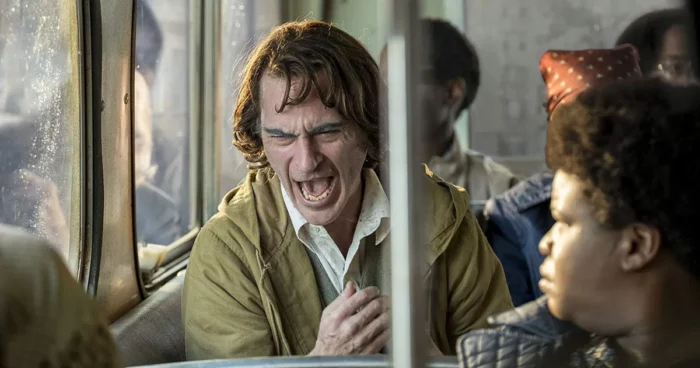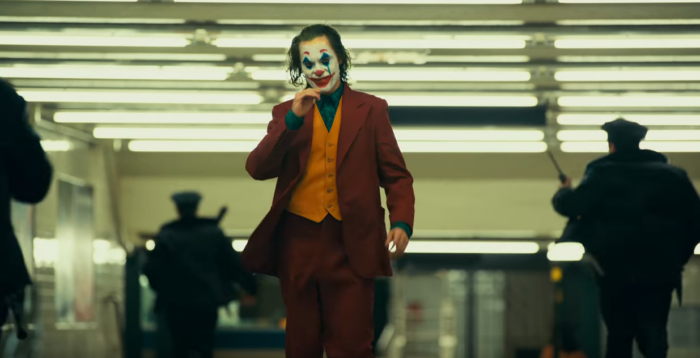
The 92nd Academy Awards (2020)
Nominations: 11
Wins: 2
I was thinking about this the day I watched Joker (because I was also thinking about Vampire Weekend announcing their first album in five years), but 2019 really was a different time. Covid hadn’t happened, we’d started to (sort of) adjust to Trump being president, and superhero movies were at the peak of their popularity. The latter two of these things of course coalesced in the movie Joker, melding Batman’s greatest foe and incel culture. So like many cultural moments of the Trump era, there was a lot of Discourse around it.
Now, with a new Joker movie coming out later this year and the benefit of a few years of distance from the film’s release, I wanted to try and revisit this movie without all of its cultural baggage and take it in more on its merits as a film, which apparently there was enough of to earn Oscars. Though that’s going to be a little hard, since its messaging (or lack thereof) is still a little hard to separate from what this movie is doing within the confines of its own vision of Gotham City.
I’m not going to go too into detail about the plot, since no one needs to hear me recount the plot of Joker. But the movie centers on Arthur Fleck (played by Joaquin Phoenix), a loner living in early ’80s Gotham looking a little too much like early ’80s New York. He shares an apartment with his mother and works as a clown in multiple capacities. First, we see him twirling a sign for a business, and then cheering up patients at a hospital, where he accidentally drops a gun in front of them. This gets him fired from his job, which leads to him being on the subway one day, and at the end of his rope, takes out his frustration on a couple of businessmen by shooting all three of them. This becomes a big news story in Gotham, as the police are looking for the murderer dressed in a clown outfit, especially when businessman and mayoral hopeful Thomas Wayne addresses the murders on TV.
Another thing to know about Arthur is that he laughs a lot. He also has dreams of becoming a stand-up comedian, writing down his “jokes” as well as his “tWiStEd” thoughts in a journal that his social worker advises him to write in. All of these things merge when Arthur tries to perform stand-up at a local club, though he launches into a laughing fit onstage, much to the confusion of the club’s audience. However, a clip of the performance ends up on the late-night talk show hosted by Murray Franklin (Robert DeNiro giving us King of Comedy flashbacks), and Franklin wants to have Arthur on the show. Seeing as Arthur has been obsessed with Murray’s show for a long time, he’s eager to make an appearance, which doesn’t turn out to be a great idea (to say the least) considering Arthur’s mental decline, new-found villainy, and preference to be referred to as “Joker”.
There was a lot of press at the time about how Joker was influenced by the Martin Scorsese films Taxi Driver and King of Comedy, and that much is very obvious. Probably too obvious. The casting of DeNiro already makes you very aware of this, but it also feels like there are multiple shots and moments in Joker lifted from both films, while there’s a very blatant Network reference toward the end as well. Which in theory should be fine. There’s nothing wrong with a little homage thrown into an otherwise tried-and-true genre, especially when directors like Quentin Tarantino and Edgar Wright have made a career of it.
But I suppose where I struggle with this movie is that there isn’t much personality or stylistic panache outside of the Scorsese references. The film feels fairly by-the-numbers from a filmmaking standpoint, and even if it evokes the general vibes of those Scorsese movies, it doesn’t have the same bracing energy as them. This makes it all the more perplexing why Todd Phillips was nominated for a Best Director Oscar, but I suppose the Academy just couldn’t resist another Greta Gerwig snub.
In fact, Joker was the most nominated movie at the Oscars that year, which I think is some combination of the movie having plenty to appreciate from a crafts perspective and the Academy wanting to give some recognition to a superhero movie when the genre was making the industry a lot of money that year. And I think its relation to the superhero genre is where there’s the most to appreciate about Joker. It definitely is not your typical superhero movie, containing little of what you would consider “action sequences” while relying almost entirely on character development to move the story forward. Meanwhile, it uses just enough traces of the larger Batman universe to still feel like a Batman movie, even if I sometimes found it distracting how much it felt like it takes place in New York rather than Gotham City.
So in that respect, I think it does do something unique within the superhero genre. Also, even though “dark” superhero movies had existed before this, and especially in the DC adaptations, this movie hits on a different kind of darkness. It’s not just making the mise en scène literally hard to see or making the violence slightly more brutal than usual, but it’s actually trying to probe what makes a human being turn into a villain after being rejected by society time and time again. Now, I say “trying” because I’m not sure that the movie has anything new to say about loners or societal outcasts, but it more just feels a little novel seeing this kind of brooding character-driven story in the context of a Batman movie.
This gets to the main problem with the movie, which is that it doesn’t quite feel like it needed to exist. This is especially true considering it would be very easy for the wrong type of person to interpret Arthur’s transformation from loser to vigilante as glamorous in some way. Again, I don’t really want to get too deep into the real-world implications of releasing a big-budget movie with this type of content to the general public, but the movie’s unnuanced depiction of Arthur’s arc still feels a little irresponsible. But what’s even more bothersome is that there were already so many movies about misunderstood loners, so plopping this kind of nihilistic downward spiral into a superhero movie just feels a little hollow at the end of the day.
Getting back to the film’s showing at the 92nd Oscars, I don’t have a huge problem with Joaquin Phoenix winning Best Actor for this role, even if it feels like a legacy award for a lot of his earlier work in less commercially successful movies. He had played weird loners like this before (and probably better) in movies like You Were Never Really Here and The Master, so he’s not really doing anything that we didn’t know he was capable of. But no one commits to a role like Joaquin does, and this is ultimately a pretty memorable take on the Joker despite there being a lot of recent competition. The other Oscar that Joker won was for Best Score, going to Hildur Guðnadóttir, which I’m a little more confused by, as the actual score felt a little generic and less memorable overall than the movie’s sometimes good, sometimes perplexing needle drops.
It all adds up to a movie that isn’t quite as radical as it wants to be and whose dourness makes it a bit of a slog, even if it has its thrilling moments. Anyways, that’s all I can muster for Joker, a movie that too much ink has already been spilled over, which I probably didn’t need to add to, but oh well. Let’s just hope we don’t have to go through the same thing all over again when Joker: Folie á Deux comes out. Though I wouldn’t count on it.


